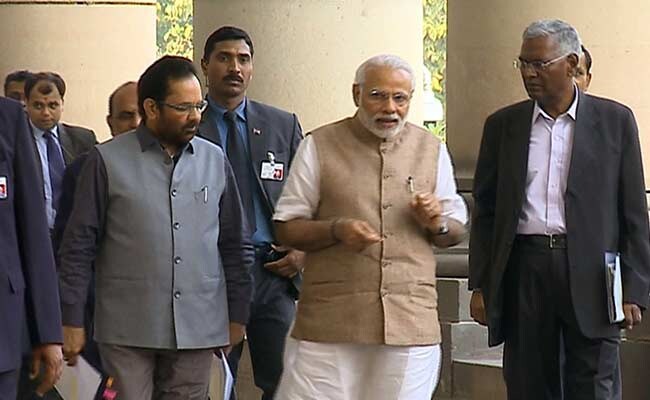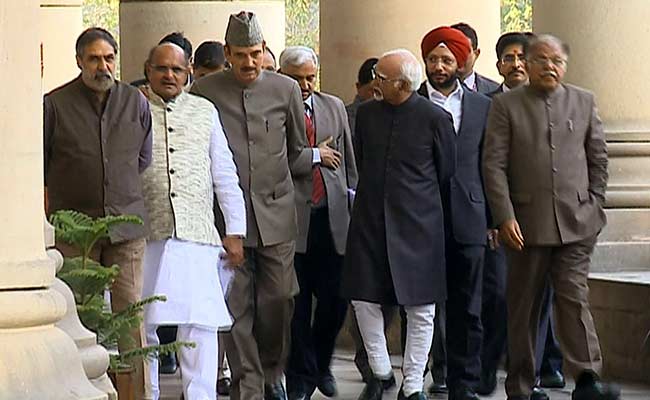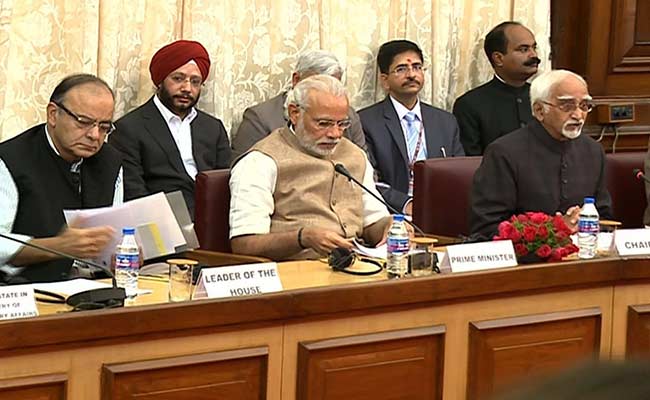
The government hopes to pass key bills in the session.
New Delhi:
The government and opposition today worked out a plan to allow the Rajya Sabha to run during the Budget Session of Parliament, which begins on Tuesday. The JNU Crisis and Hyderabad University scholar Rohith Vemula's death will be debated before any bill is taken up, it was decided.
The agreement came following a strong nudge from the Vice President and Chairman of the Upper House, Hamid Ansari, at an all-party meeting attended by Prime Minister Narendra Modi today.
None of the important pending legislations including the Goods and Services Tax or GST, bankruptcy and real estate bills will be taken up in the first part of the session which ends in March, it was decided today.
 Mr Ansari set the tone for the truce with his strong-worded appeal for "debate not disruption" in the Upper House which has witnessed virtually no business being conducted for the last few sessions. He told government and opposition representatives, "Time has come to assure the public that Parliamentary democracy works and is sensitive to the needs of its citizen."
Mr Ansari set the tone for the truce with his strong-worded appeal for "debate not disruption" in the Upper House which has witnessed virtually no business being conducted for the last few sessions. He told government and opposition representatives, "Time has come to assure the public that Parliamentary democracy works and is sensitive to the needs of its citizen."
Apparently worried over the negative perception Parliamentary disruptions are creating, the opposition agreed to short term discussions on the two issues at the very start of the session. The government has also agreed to discussions on law and order in the Delhi, the attack on journalists and JNU student Kanhaiya Kumar, Arunachal Pradesh and farm distress.
 The government is keeping its fingers crossed. Deferring the GST bill for the second half of the session means putting it at a risk. The peace it has achieved remains fragile. "The government is keen to see the return of peace first. We have agreed to debate anything provided the opposition lets the house run. Once the debates on issue flagged by the opposition are over they would have to keep their side of the bargain," a senior minister told NDTV.
The government is keeping its fingers crossed. Deferring the GST bill for the second half of the session means putting it at a risk. The peace it has achieved remains fragile. "The government is keen to see the return of peace first. We have agreed to debate anything provided the opposition lets the house run. Once the debates on issue flagged by the opposition are over they would have to keep their side of the bargain," a senior minister told NDTV.
Mr Ansari has been holding meetings to end the deadlock, including one between the government and the Congress leaders earlier this week. The largest opposition party is said to have eased its aggressive stance after public pressure against disruptions and building impatience among parties like the SP, Trinamool and BJD.
The agreement came following a strong nudge from the Vice President and Chairman of the Upper House, Hamid Ansari, at an all-party meeting attended by Prime Minister Narendra Modi today.
None of the important pending legislations including the Goods and Services Tax or GST, bankruptcy and real estate bills will be taken up in the first part of the session which ends in March, it was decided today.

The meeting was attended by senior mmbers of the Opposition.
Apparently worried over the negative perception Parliamentary disruptions are creating, the opposition agreed to short term discussions on the two issues at the very start of the session. The government has also agreed to discussions on law and order in the Delhi, the attack on journalists and JNU student Kanhaiya Kumar, Arunachal Pradesh and farm distress.

PM Narendra Modi and Finance Minister Arun Jaitley spoke for the government.
Mr Ansari has been holding meetings to end the deadlock, including one between the government and the Congress leaders earlier this week. The largest opposition party is said to have eased its aggressive stance after public pressure against disruptions and building impatience among parties like the SP, Trinamool and BJD.
Track Latest News Live on NDTV.com and get news updates from India and around the world

